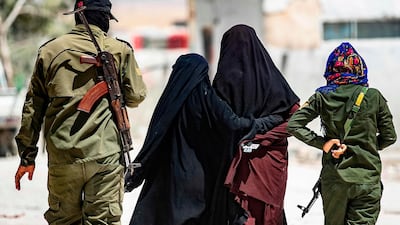Indonesia is investigating a report that a pregnant citizen who had joined ISIS was killed after being tortured in a refugee camp in Syria
Local media reported that the corpse of the woman was found in the Al Hol refugee camp in northern Syria. Kurdish security forces say an autopsy suggested the woman, who was six months pregnant, was murdered and her body showed signs of torture.
Other ISIS supporting women are suspected of killing her, with security forces searching for the perpetrators inside the camp.
Al Hol camp is home to over 70,000 mostly women and children, many of whom are relatives of male ISIS fighters. Men who surrendered to Kurdish-led Syrian Democratic Forces (SDF) are held separately in Kurdish jails.
Conditions inside overcrowded Al Hol camp are dire, with aid agencies reporting a lack of healthcare, sanitation facilities and food. The British based Syrian Observatory for Human Rights reported on Wednesday that 386 children have died at the camp since January.
Most of the camps inhabitants were among the tens of thousands who surrendered during the SDF's final offensive against ISIS earlier this year. The US-backed forces announced the capture of the last ISIS-held territory in April, after retaking the farming hamlet of Baghouz in the Euphrates River valley.
Many residents in Al Hol maintain their support for ISIS. Women have attacked the guards and the black flag of ISIS has been raised over the camp. Residents who have renounced their support for ISIS have been attacked by hardcore ideologues and their tents burned.
Many in Al Hol are from Syria and Iraq but citizens from over 40 countries are present. The SDF has called repeatedly for countries to repatriate their nationals.
Hundreds of Indonesians are believed to travelled to Syria to join ISIS and those who survived the conflict are mostly being held in camps like Al Hol.
The Indonesian government has floated plans to repatriate citizens from the war-torn country, and enrol them in deradicalisation programmes, but concerns remain they may bring violent, extremist ideology or combat skills with them.
Teuku Faizasyah, a spokesman for the Indonesian foreign ministry, said the embassy in Damascus was trying to verify reports that the woman had been beaten to death.
"The conflict and armed violence in Syria makes the verification process harder and complex," he told Reuters in a text message.

